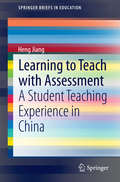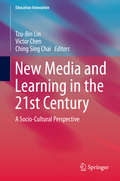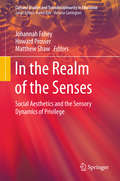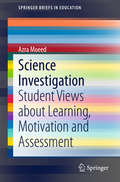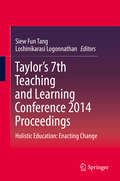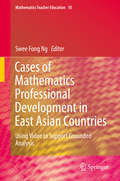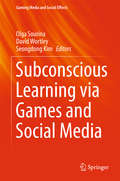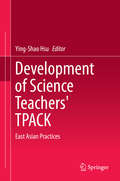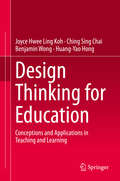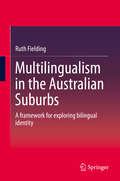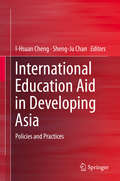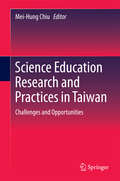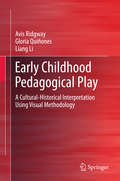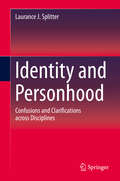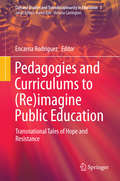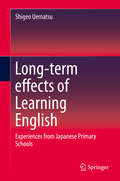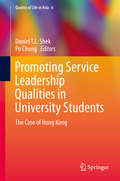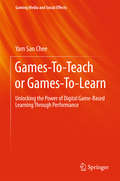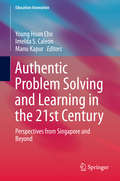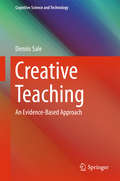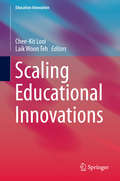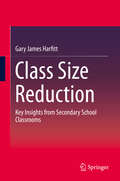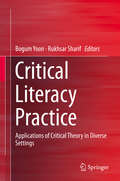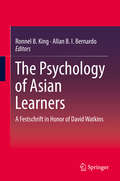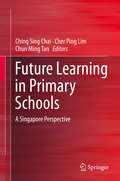- Table View
- List View
Learning to Teach with Assessment
by Heng JiangThis ethnography asks the question, what does learning to teach mean to student teachers and to those around them in an exam-driven rural school in China? The author writes of the process of using the assessment as a tool for teacher learning, understanding disadvantaged students in the community of practice, and of beginning teachers seeking their identities. She offers a perspective of learning to teach with assessment instead of for assessment, and examines how it shapes the learn-to-teach experiences.
New Media and Learning in the 21st Century
by Tzu-Bin Lin Victor Chen Ching Sing ChaiThis volume brings together conceptualizations and empirical studies that explore the socio-cultural dimension of new media and its implications on learning in the 21st century classroom. The authors articulate their vision of new-media-enhanced learning at a global level. The high-level concept is then re-examined for different degrees of contextualization and localization, for example how a specific form of new media (e-reader) changes specific activities in different cultures. In addition, studies based in Singapore classrooms provide insights as to how these concepts are being transformed and implemented by a co-constructive effort on the part of researchers, teachers and students. Singapore classrooms offer a unique environment to study the theory-practice nexus in that they are high achieving, implicitly grounded in the eastern cultural values and well-equipped with ICT infrastructure. While these studies are arguably the state-of-the-art exemplars that synergize socio-cultural and technological affordances of the current learning environments, they also serve as improvable ideas for further innovations. The interplay between theory and practice lends support to the reciprocal improvements for both. This book contributes to the continuing debate in the field, and will lead to better learning environments in the 21st century.
In the Realm of the Senses
by Johannah Fahey Howard Prosser Matthew ShawThis book charts new territory both theoretically and methodologically. Drawing on MacDougall's notion of social aesthetics, it explores the sensory dimensions of privilege through a global ethnography of elite schools. The various contributors to the volume draw on a range of theoretical perspectives from Lefebvre, Benjamin, Bourdieu, Appadurai, Kress and van Leeuwen to both broaden and critique MacDougall's original concept. They argue that within these elite schools there is a relationship between their 'complex sensory and aesthetic environments' and the construction of privilege within and beyond the school gates. Understanding the importance of the visual to ethnography, the social aesthetics of these elite schools are captured through the inclusion of a series of visual essays that complement the written accounts of the aesthetics of privilege. The collection also includes a series of vignettes that further explore the sensory dimension of these aesthetics: touch, taste--though metaphorically understood-- sight and sound. These varying formats illustrate the aesthetic nature of social relations and the various ways in which class permeates the senses. The images from across the different schools and their surroundings immerse the reader in these worlds and provide poignant ethnographic data of the forces of globalisation within the context of elite schooling.
Science Investigation
by Azra MoeedThis book reports the findings of an interpretive case study of the phenomenon of science investigation (science inquiry) from students' perspective. Data were collected from a class of twenty-four Year 11 students in a middle size, co-educational New Zealand school, through Science Laboratory Environment Inventory, student questionnaires, focus group interviews and classroom observations. The participants provided some insightful comments about their learning of science investigation. Illustrative examples highlight; what students found motivational and what demotivated them, what and how they learnt through carrying out science investigation, and how internal assessment influenced their motivation to learn and learning. The connectedness between the complexities of learning science investigation and how motivation, and assessment influenced these 15 year old students' learning is discussed.
Taylor's 7th Teaching and Learning Conference 2014 Proceedings
by Siew Fun Tang Loshinikarasi LogonnathanThese conference proceedings showcase a rich and practical exchange of approaches and vital evidence-based practices taking place around the world. They clarify the complex challenges involved in bringing about a holistic educational environment in schools and institutes of higher learning that fosters greater understanding and offer valuable insights on how to avoid the pitfalls that come with rolling out holistic approaches to education. To do so, the proceedings focus on the subthemes Support and Development, Mobility and Diversity and Networking and Collaboration in Holistic Education.
Cases of Mathematics Professional Development in East Asian Countries: Using Video to Support Grounded Analysis (Mathematics Teacher Education #10)
by Swee Fong NgThis book shows how video technology can be used to inform teachers' personal practice, and provides new data and real-world case studies not covered by any previous book on the subject. Initial chapters explore how practicing teachers can view their own recorded lessons and take steps to improve their methods, while subsequent chapters examine how pre-service and in-service teachers can use recorded lessons to improve how they teach selected concepts, or to better convey specific learning processes such as mathematical modeling and problem solving.
Subconscious Learning via Games and Social Media
by Olga Sourina David Wortley Seongdong KimThis book provides a detailed update on the applications of Serious Games in Healthcare and Education sector. In short, it provides an all rounded research and industry updates about the current and future advances in this area. These are the two sectors that are developing rapidly with direct applications of serious games. With advances in technologies and a new perspective on patient engagement and public expectations, the healthcare sector is increasingly turning to serious games to solve problems. Subconscious Learning via Games and Social Media will share expert opinions on the development and application of game technologies for health-related serious games. Our commercial and non-commercial expert comes from different aspects of the healthcare system from clinicians to therapist. The scope ranges from population health to specific medical domain applications. In the education sector, digital games have a great potential to improve learning of both adults and children. It is important to understand how to design games that could create long term behavioral change rather than short term alterations. In these chapters, we discuss how the serious games should be designed and deployed for both adults and children.
Development of Science Teachers' TPACK
by Ying-Shao HsuScience is a subject matter that requires learners to explore the world and develop their own abilities on the basis of that exploration. As technology broadens and deepens, science teachers need to expand their Technological Pedagogical Content Knowledge (TPACK), which determines how well they use technology to help students learn science. The book details our efforts to prepare science teachers to teach with the help of technology, examining various aspects of teacher education, professional development and teaching material preparation. It consists of three parts, which focus on: how TPACK is conceptually constructed within the field of science education, how teacher evaluation and teaching materials are developed and utilized based on the transformative model and how science teachers are prepared and supported with electronic resources based on the integrative model. The book offers a valuable resource for all those working in science education, as well as those readers who are interested in teacher education. Science teachers will come to know how simulations and animations can pedagogically support student learning. Practices for teachers' TPACK development such as learning-by-design, evaluation and measurement and teacher communities are also addressed, applied and discussed in the case of science teachers. The individual chapters will provide teacher educators and researchers from all disciplines with new insights into preparing teachers for the Digital Era.
Design Thinking for Education
by Joyce Hwee Ling Koh Ching Sing Chai Benjamin Wong Huang-Yao HongThis book explores, through eight chapters, how design thinking vocabulary can be interpreted and employed in educational contexts. The theoretical foundations of design thinking and design in education are first examined by means of a literature review. This is then followed by chapters that characterize design thinking among children, pre-service teachers and in-service teachers using research data collected from the authors' design-driven coursework and projects. The book also examines issues associated with methods for fostering and assessing design thinking. In the final chapter, it discusses future directions for the incorporation of design thinking into educational settings. Intended for teachers, teacher educators and university instructors, this book aims to provide them with the theoretical foundations needed to grasp design thinking, and to provide examples of how design thinking can be interpreted and evaluated. The materials covered will help these groups of professionals to consider how design thinking can be integrated into their own teaching and learning contexts. The book will also promote a discourse between educational researchers on the theoretical development of design thinking in educational settings.
Multilingualism in the Australian Suburbs
by Ruth FieldingThis book introduces a framework for examining bilingual identity and presents the cases of seven individual children from a study of young students' bilingual identities in an Australian primary school. The new Bilingual Identity Negotiation Framework brings together three elements that influence bilingual identity development - sociocultural connection, investment and interaction. The cases comprise individual stories about seven young, bilingual students and are complemented by some more general investigations of bilingual identity from a whole class of students at the school. The framework is explained and supported using the students' stories and offers readers a new concept for examining and thinking about bilingual identity. This book builds upon past and current theories of identity and bilingualism and expands on these to identify three interlinking elements within bilingual identity. The book highlights the need for greater dialogue between different sectors of research and education relating to languages and bilingualism. It adds to the increasing call for collaborative work from the different fields interested in language learning and teaching such as TESOL, bilingualism, and language education. Through the development of the framework and the students' stories in this study, this book shows how multilingual children in one school in Australia developed their identities in association with their home and school languages. This provides readers with a model for examining bilingual identity in their own contexts, or a theoretical construct to consider in their thinking on bilingualism, language and identity.
International Education Aid in Developing Asia
by I-Hsuan Cheng Sheng-Ju ChanThis book provides an Asian perspective on the timely, urgent questions of how international education aid and development should move forward and what development roles Asia should play, especially following the end of the UN Millennium Development Goals (MDGs) and Education for All (EFA) in 2015. To answer these questions, four separate but interwoven parts, which analyze and anchor education MDGs and EFA policies and practices by means of diverse case studies of donor states, recipient states, and states with a dual and transitional role in Asia, are addressed. On the basis of the analyses, a clearer and concrete direction for effectively and sustainably extending international education aid and development beyond 2015 can be derived.
Science Education Research and Practices in Taiwan
by Mei-Hung ChiuThis book highlights the development and outcomes of research on and practical experience in science education in Taiwan. As the outcomes of the scholarship on science education in Taiwan have garnered attention in science education communities around the world, this book gathers the most relevant research on Taiwan, presenting it in a cohesive overview that will move science education forward in terms of policy, research and practice.
Early Childhood Pedagogical Play
by Avis Ridgway Gloria Quiñones Liang LiThis book re-theorizes the relationship between pedagogy and play. The authors suggest that pedagogical play is characterized by conceptual reciprocity (a pedagogical approach for supporting children's academic learning through joint play) and agentic imagination (a concept that when present in play, affords the child's motives and imagination a critical role in learning and development). These new concepts are brought to life using a cultural-historical approach to the analysis of play, supported in each chapter by visual narratives used as a research method for re-theorising play as a pedagogical activity. Whenever a cultural-historical approach is applied to understanding pedagogical play, the whole context of the playful event is always included. Further, the child's cultural environment is taken into account in order to better understand their play. Children from different countries play differently for many reasons, which may include their resources, local cultural beliefs about play and specific pedagogical practices. The inclusion and acknowledgement of social, cultural and historical contexts gives credence and value to understanding play from both child and adult perspectives, which the authors believe is important for the child's learning and development. As such, the relationships that children and adults have with human and non-human others, as well as any connections with artefacts and the material environment, are included in all considerations of pedagogical play.
Identity and Personhood
by Laurance J. SplitterThis book approaches the concept of identity from both logical-linguistic and socio-cultural perspectives, and explores its implications for our understanding of who or what we persons really are. In the process, it bridges disciplines that often remain disconnected - most notably analytic philosophy and the social sciences - and offers a novel critique of citizenship and moral education, "identity politics", and other contemporary domains of inquiry. Although the book has a multi-disciplinary focus, it is philosophical in its overall orientation (but accessible to readers from outside philosophy) and educational in its mission (but of interest to readers who are not formally educators). Chapters 2-5 discuss the philosophical and (where appropriate) scientific dimensions of identity, chapters 6-7 explore its socio-cultural dimensions and chapter 8 examines its educational dimensions and implications. The book will be of particular interest to those researching or teaching civics, citizenship education and moral education, as well as those involved in cultural, political and religious studies in a broader sense. It will also appeal to anyone who finds him- or herself wondering about the state of the world in the Twenty-First Century, and who suspects that rethinking what it means to be a person in that world might not be a bad idea.
Pedagogies and Curriculums to (Re)imagine Public Education
by Encarna RodríguezThis book discusses current market-based educational discourses and how they have undermined the notion of "the public" in public education by allowing private visions of education to define the public democratic imagination. Against this discouraging background, this text embraces Freire's understanding of hope as an ontological need and calls for finding new public grounds for our public imagination. It further articulates Freire's mandate to unveil historically concrete practices to sustain democratic educational visions, no matter how difficult this task may be, by (1) presenting an indepth description of the pedagogies and curriculums of eleven schools across historical and geographical locations that have worked or are still working with disenfranchised communities and that have publicly hoped for a better future for their students, and by (2) reflecting on how the stories of these schools offer us new opportunities to rethink our own pedagogical commitment to public visions of education. To promote this reflection, this book offers the notion of publicly imagined public education as a conceptual tool to help understand the historical and discursive specificity of schools' hopes and to (re)claim public schools as legitimate sites of public imagination.
Long-term effects of Learning English
by Shigeo UematsuThis book presents a pioneering longitudinal study on English language instruction at the elementary school (ELES) level in the Japanese public school system. It attempts to identify those domains most sensitive to early English instruction by employing a state-of-the-art quantitative research methodology. English education was formally introduced in Japan for fifth and sixth graders in 2011 and is still in its infancy as a program. This study compares two groups (Grade 7 and 8) of students, one with ELES and one without, in order to shed light on their experiences. Comparisons are carried out not only quantitatively, measuring changes in English skills (listening, speaking, reading, and vocabulary / grammar) and the ELES students' affective aspects, but also qualitatively through in-depth interviews. Thus, this study attempts to capture the ELES students' experiences from a multi-dimensional perspective. The comprehensive literature review provided offers a valuable resource not only for researchers looking for a quick digest of the literature in this field before undertaking their own research, but also for policy-makers seeking to assess how to best implement ELES.
Promoting Service Leadership Qualities in University Students
by Daniel T.L. SHEK Po ChungThis book outlines the development of service leadership curricula, programs and materials designed for university students in Hong Kong. In addition, it includes evaluation studies and specific service leadership programs, making it a pioneering book that integrates service leadership and student wellbeing for Chinese university students. In view of the transformation of industries resulting in shifts from manufacturing economies to service economies, the book takes a holistic approach to leadership development, focusing on three basic components of effective service leadership that are closely related to student wellbeing: leadership competencies such as emotional intelligence and resilience, moral character, and a caring disposition. This approach represents a move away from literature that emphasizes the elite leadership model, assuming that leadership is the privilege of a talented few. By extension, it argues that the promotion of service leadership qualities is a good strategy for promoting student wellness. The individual chapters are extended versions of papers presented at the "International Conference on Service Leadership Education for University Students: Experience in Hong Kong," which was held in May 2014. The book offers a valuable contribution to Chinese and global academic literature on service leadership and will benefit researchers and educators alike.
Games-To-Teach or Games-To-Learn
by Yam San CheeThe book presents a critical evaluation of current approaches related to the use of digital games in education. The author identifies two competing paradigms: that of games-to-teach and games-to-learn. Arguing in favor of the latter, the author advances the case for approaching game-based learning through the theoretical lens of performance, rooted in play and dialog, to unlock the power of digital games for 21st century learning. Drawing upon the author's research, three concrete exemplars of game-based learning curricula are described and discussed. The challenge of advancing game-based learning in education is addressed in the context of school reform. Finally, future prospects of and educational opportunities for game-based learning are articulated. Readers of the book will find the explication of performance theory applied to game-based learning especially interesting. This work constitutes the author's original theorization. Readers will derive four main benefits: (1) an explication of the difference between game-based-teaching and game-based learning, and why this difference is of critical importance, (2) an exposition of the theory of game-based learning as performance, (3) concrete exemplars and research outcomes relating to three game-based learning curricula that have been empirically evaluated in schools, and (4) an understanding of complex issues related to the human side of school change that must be effectively addressed to achieve take-up of game-based learning in schools.
Authentic Problem Solving and Learning in the 21st Century: Perspectives from Singapore and Beyond (Education Innovation Series)
by Young Hoan Cho Imelda S. Caleon Manu KapurWith the rapid changes in the social, political, economic and technological landscape around the world, today's learners face a more globally competitive job market after leaving school. The 21st century, which is characterized by the emergence of knowledge-based societies, expects learners to be comfortable in dealing with ambiguities and complexities in the real world and to be able to use knowledge as a tool at their workplace. This book will help readers develop an in-depth understanding of authentic problem solving and learning, and how it can be used to make a difference in their school or learning communities for the development of 21st century competencies. Comprising 20 chapters written by Singapore-based and international authors, the book is organized into three themes: authentic problems, authentic practices, and authentic participation. It details innovative school practices (e. g. productive failure) concerning the design of problems, learning activities, learning environments, and ICT tools for authentic problem solving and learning. Along with theoretical explanations of authentic learning processes and outcomes, the book also elucidates how students learn by generating and exploring solutions to complex problems and which cognitive functions are needed at different stages of problem-based learning. Presenting coherent descriptions of instructional design principles, successful cases and challenges encountered in K-12 schools and learning communities, the book provides useful information, new insights, and practical guidance for school directors, parents, teachers and researchers seeking to develop authentic learning environments for 21st century learners.
Creative Teaching: An Evidence-Based Approach (Cognitive Science and Technology)
by Dennis SaleThis book contains an evidence-based pedagogic guide to enable any motivated teaching/training professional to be able to teach effectively and creatively. It firstly summarises the extensive research field on human psychological functioning relating to learning and how this can be fully utilised in the design and facilitation of quality learning experiences. It then demonstrates what creativity actually 'looks like' in terms of teaching practices, modelling the underpinning processes of creative learning design and how to apply these in lesson planning. The book, having established an evidence-based and pedagogically driven approach to creative learning design, extensively focuses on key challenges facing teaching professionals today. These include utilising information technologies in blended learning formats, differentiating instruction, and developing self-directed learners who can think well. The main purpose of the book is to demystify what it means to teach creatively, explicitly demonstrating the principles of good pedagogic design and communication strategies that underpin such activity. The message is clear - creative teaching competence is both a highly useful and a learnable capability.
Scaling Educational Innovations
by Chee-Kit Looi Laik Woon TehThis volume stimulates critical discussions of the different variants of implementation, translation and scaling research approaches. It presents an integrated collection of different implementation and scaling studies that analyse the different facets of co-design, learning design, curriculum development, technology development, professional development and programme implementation. It also provides critical reflections on their impact and efficacies on transforming practices, informing policy-making, and theory derivation and improvement. The chapters in this volume will provide readers a deeper understanding of scaling of educational innovations in diverse socio-cultural contexts.
Class Size Reduction: Key Insights from Secondary School Classrooms
by Gary James HarfittThis book provides a timely examination of the effects of class size reduction (CSR) on teaching and learning processes. It represents a departure in that the research covered focuses solely on the relationship between CSR and effective teaching in real secondary school classrooms. The book also presents a much-needed and powerful student voice on the impact of class size reduction on teaching and learning processes. It conceptualises the effects of class size on teaching and learning processes in secondary school classrooms, which are another under-researched perspective in this field. Drawing on multiple case studies concerning teaching and learning processes in large and small Hong Kong secondary-school classes, it highlights the qualitative differences in teaching and learning processes. On the basis of those studies, the book argues for a more purposeful, dynamic approach to education for teachers working in small or reduced-size classes.
Critical Literacy Practice: Applications of Critical Theory in Diverse Settings
by Bogum Yoon Rukhsar SharifThis edited book shows how critical literacy can be applied in and outside the classroom setting. It shows educators how critical theory is applied in practice using studies in diverse K-16 settings, kindergarten through university contexts. By providing specific examples of critical literacy practice in the classroom and beyond, the book aims to help teachers, researchers and teacher educators make clear connections between theory and practice in critical literacy.
The Psychology of Asian Learners
by Ronnel B. King Allan B. I. BernardoThis book celebrates the scholarly achievements of Prof. David A. Watkins, who has pioneered research on the psychology of Asian learners, and helps readers grasp the cognitive, motivational, developmental, and socio-cultural aspects of Asian learners learning experiences. A wide range of empirical and review papers, which examine the characteristics of these experiences as they are shaped by both the particularities of diverse educational systems/cultural milieus and universal principles of human learning and development, are showcased. The individual chapters, which explore learners from fourteen Asian countries, autonomous regions, and/or economies, build on research themes and approaches from Prof. Watkins' research work, and are proof of the broad importance and enduring relevance of his seminal psychological research on learners and the learning process.
Future Learning in Primary Schools
by Ching Sing Chai Cher Ping Lim Chun Ming TanThis edited book tells the story of the multifaceted efforts devoted by a "future school" in Singapore--The Nan Chiau Primary School--in shaping future learning. It documents the various measures implemented by one primary school to improve student learning outcomes in a technology-rich teaching and learning environment. With the current interest in Singapore's "Masterplan for ICT (information and communication technology) in Education," and the increasing focus on teaching and learning design by leading education researchers and professionals, this well-timed book will appeal to policy makers, educators and researchers.
